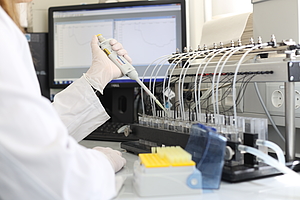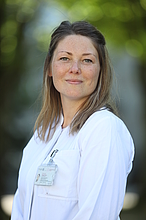Forschungsschwerpunkt Pathophysiologie des Kurzdarmsyndroms
Peggy Berlin - Mechanismen der intestinalen Adaptation im experimentellen Kurzdarmsyndrom-Rolle von NOD2


Ein weiterer Forschungsschwerpunkt der Abteilung ist die Pathogenese des Kurzdarmsyndroms. Ein Kurzdarmsyndrom entsteht durch die ungenügende Resorption von Makronährstoffen und/oder Wasser und Elektrolyten nach Resektion größerer Teile des Dünndarms. Der verbliebene Darm durchläuft im Anschluss an die Resektion Adaptationsprozesse, die sowohl morphologische als auch funktionelle Veränderungen beinhalten. Im Rahmen verschiedener Projekte werden sowohl auf Zellebene als auch im Mausmodell Mechanismen der intestinalen Adaptation untersucht. Dazu wurde in enger Kooperation mit der Abteilung für Allgemein-, Viszeral-, Gefäß- und Transplantationschirurgie (Frau PD Dr. med. habil. M. Witte) ein Kurzdarmmodell der Maus etabliert. Nach chirurgischer Entfernung von Ileum und Zökum entsteht eine Darminsuffizienz mit dem klinischen Bild des Kurzdarmsyndroms. Mit diesem deutschlandweit einzigartigen Modell können klinisch hochrelevante Fragestellungen untersucht werden, die aufgrund der Seltenheit des Kurzdarmsyndroms und den heterogenen Patientenkohorten am Patienten nicht untersuchbar sind. Im Vordergrund stehen dabei Faktoren, welche die Adaptation an die Kurzdarmsituation beeinflussen. Ein solcher Faktor ist die Mutation von NOD2 (Nucleotide-binding oligomerization domain-containing protein 2) , die ebenfalls mit der Krankheitsentstehung bei Morbus Crohn in Zusammenhang gebracht wird. NOD2 Mutationen werden gehäuft bei Patienten mit schweren Verläufen des Kurzdarmsyndroms, unabhängig von Crohn-Krankheit, nachgewiesen. Ziel des DFG-geförderten Forschungsprojekts ist es, die Bedeutung des NOD2 Rezeptors für den Verlauf nach Kurzdarmoperation zu untersuchen (DFG-Förderkennzeichen BE 629/1-1). Fokus der Arbeiten bildet die Interaktion von Darmbarrierefunktion, Ionentransport, gastrointestinalem Immunsystem und Mikrobiom. Das Methodenspektrum der Arbeitsgruppe umfasst zellbiologische, gentechnische und molekularbiologische Standardmethoden. Des Weiteren untersuchen wir Zellen und Gewebe in der Ussing-Kammer und im Live Cell Imaging System und kollaborieren mit dem Institut für Mikrobiologie (Herr Prof. Dr. rer. nat. B. Kreikemeyer) für die Analyse des intestinalen Mikrobioms in der Kurzdarm-Maus.
We study the pathogenesis of the short bowel syndrome. Short bowel syndrome results from the impaired absorption of macronutrients and/or water and electrolytes after extensive intestinal resection. Upon resection, different morphological and functional changes of the epithelium occur due to the adaptive capacity of the remaining intestine. We use cell culture models and a mouse model to study mechanisms of intestinal adaptation. In close collaboration with the Department of General, Thoracic, Vascular and Transplantation Surgery (PD Dr. med. habil. M. Witte), we recently have established a short bowel model in mice. After surgical resection of the ileum and the cecum, mice develop intestinal insufficiency that is similar to the clinical course of short bowel syndrome in humans. With the help of this nationwide unique model, we are able to address clinically high-relevant questions. We focus on risk factors of intestinal failure such as NOD2 (Nucleotide-binding oligomerization domain-containing protein 2) mutation. NOD2 mutations are associated with both, the pathogenesis of Crohn´s disease and with an impaired outcome in short bowel patients. The aim of an ongoing DFG-funded project is to study the role of the NOD2 receptor in intestinal adaptation after bowel resection (DFG-Förderkennzeichen BE 629/1-1). We focus on the interplay between gut barrier function, ion transport, intestinal immune system and microbiome. We use standard methods in cell biology, genetic engineering, and molecular biology. Additionally, we perform Ussing chamber studies and live cell imaging with cells and tissues and collaborate with the Institute for Microbiology, Virology, and Hygiene (Prof. Dr. rer. nat. B. Kreikemeyer) to analyze the intestinal microbiome in short bowel mice.
Wichtigste Projekt-relevante Publikationen
- The dual GLP-1 and GLP-2 receptor agonist dapiglutide promotes barrier function in murine short bowel. Reiner J, Thiery J, Held J, Berlin P, Skarbaliene J, Vollmar B, Jaster R, Eriksson PO, Lamprecht G, Witte M. Ann N Y Acad Sci. 2022 May 17. doi: 10.1111/nyas.14791. PMID: 35580981
- Dapiglutide, a novel dual GLP-1 and GLP-2 receptor agonist, attenuates intestinal insufficiency in a murine model of short bowel. Reiner J, Berlin P, Held J, Thiery J, Skarbaliene J, Griffin J, Russell W, Eriksson PO, Berner-Hansen M, Ehlers L, Vollmar B, Jaster R, Witte M, Lamprecht G. JPEN J Parenter Enteral Nutr. 2021 Oct 27. doi: 10.1002/jpen.2286. PMID: 34705281
Witte M, Reiner J, Bannert K, Jaster R, Maschmeier C, Schafmayer C, Lamprecht G, Berlin P. Ileocolonic Healing After Extended Small Bowel Resection in Mice: NOD2 Deficiency Impairs Anastomotic Healing and Postoperative Outcome. Inflamm Bowel Dis. 2021. PMID: 33555306
Reiner J, Berlin P, Wobar J, Schäffler H, Bannert K, Bastian M, Vollmar B, Jaster R, Lamprecht G, Witte M. Teduglutide Promotes Epithelial Tight Junction Pore Function in Murine Short Bowel Syndrome to Alleviate Intestinal Insufficiency. Dig Dis Sci. 2020 65:3521-3537. PMID: 32072437
- Berlin P, Reiner J, Witte M, Wobar J, Lindemann S, Barrantes I, Kreikemeyer B, Bastian M, Schäffler H, Bannert K, Jaster R, Lamprecht G. Nod2 deficiency functionally impairs adaptation to short bowel syndrome via alterations of the epithelial barrier function. Am J Physiol Gastrointest Liver Physiol. 2019; 317(5):G727-G738 PMID: 31509436
- Berlin P, Reiner J, Wobar J, Bannert K, Glass Ä, Walter M, Bastian M, Willenberg HS, Vollmar B, Klar E, Seidler U, Lamprecht G, Witte M. Villus Growth, Increased Intestinal Epithelial Sodium Selectivity, and Hyperaldosteronism Are Mechanisms of Adaptation in a Murine Model of Short Bowel Syndrome. Dig Dis Sci. 2019;64(5):1158-1170. PMID: 30569336
- Lamprecht G, Bodammer P. Nutritional strategies to enhance adaptation in intestinal failure. Curr Opin Organ Transplant. 2016;21(2):140-6. PMID: 26881492 Review.
- Schäffler H, Demircioglu DD, Kühner D, Menz S, Bender A, Autenrieth IB, Bodammer P, Lamprecht G, Götz F, Frick JS. NOD2 stimulation by Staphylococcus aureus-derived peptidoglycan is boosted by Toll-like receptor 2 costimulation with lipoproteins in dendritic cells. Infect Immun. 2014;82(11):4681-8. PMID: 25156723
- Schäffler H, Schneider N, Hsieh CJ, Reiner J, Nadalin S, Witte M, Königsrainer A, Blumenstock G, Lamprecht G. NOD2 mutations are associated with the development of intestinal failure in the absence of Crohn's disease. Clin Nutr. 2013;32(6):1029-35. PMID: 23562557

